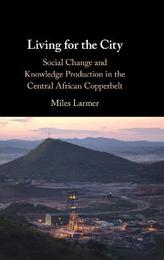
|
Living for the City: Social Change and Knowledge Production in the Central African Copperbelt
Hardback
Main Details
| Title |
Living for the City: Social Change and Knowledge Production in the Central African Copperbelt
|
| Authors and Contributors |
By (author) Miles Larmer
|
| Physical Properties |
| Format:Hardback | | Pages:288 | | Dimensions(mm): Height 235,Width 157 |
|
| Category/Genre | African history
Economic history |
|---|
| ISBN/Barcode |
9781108833158
|
| Classifications | Dewey:967 |
|---|
| Audience | | Professional & Vocational | |
|---|
| Illustrations |
Worked examples or Exercises; Worked examples or Exercises
|
|
Publishing Details |
| Publisher |
Cambridge University Press
|
| Imprint |
Cambridge University Press
|
| Publication Date |
12 August 2021 |
| Publication Country |
United Kingdom
|
Description
Living for the City is a social history of the Central African Copperbelt, considered as a single region encompassing the neighbouring mining regions of Zambia and the Democratic Republic of Congo. The Haut Katanga and Zambian Copperbelt mine towns have been understood as the vanguard of urban 'modernity' in Africa. Observers found in these towns new African communities that were experiencing what they wrongly understood as a transition from rural 'traditional' society - stable, superstitious and agricultural - to an urban existence characterised by industrial work discipline, the money economy and conspicuous consumption, Christianity, and nuclear families headed by male breadwinners supported by domesticated housewives. Miles Larmer challenges this representation of Copperbelt society, presenting an original analysis which integrates the region's social history with the production of knowledge about it, shaped by both changing political and intellectual contexts and by Copperbelt communities themselves. This title is available as Open Access on Cambridge Core.
Author Biography
Miles Larmer is Professor of African History in the Faculty of History and African Studies Centre, St Antony's College, University of Oxford, and Research Fellow in the Department of Historical and Heritage Studies at the University of Pretoria. A Fellow of the Royal Historical Society, he is the author of The Katangese Gendarmes and War in Central-Southern Africa, 1960-1999, with Erik Kennes (2016), Rethinking African Politics: A History of Opposition in Zambia (2011) and Mineworkers in Zambia: Labour and Political Change in Post-Colonial Africa, 1964 - 1991 (2007).
Reviews'This is a superb book, a model for combining social history with the history of knowledge production. It not only offers fresh perspectives on the Central African Copperbelt, but sets an example for a better understanding and a nuanced interpretation of broader transformations in Africa since the 1950s.' Andreas Eckert, Humboldt University Berlin 'This book helps us see the central African Copperbelt in a new light. Company towns were fulcrums for new forms of thought, engines for the creation of new kinds of culture, incubators for new literary projects, forcing-houses for new kinds of politics. Grounded on research in a wide range of archives, and drawing from oral interviews in Zambia and the Congo, Miles Larmer's impressive book gives labor history new dimensions, helping us glimpse the intellectual worlds where miners lived.' Derek Peterson, University of Michigan '... an excellent book, that is innovative in its border-crossing approach of the Central African Copperbelt, in its combination of social and intellectual history, and in its incisive critique of mining industry, during and after colonial rule.' Geert Castryck, H-Soz-Kult
|